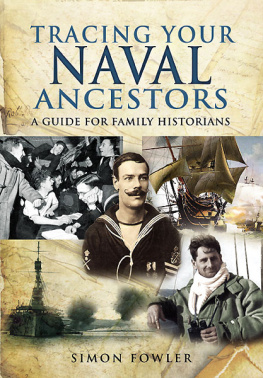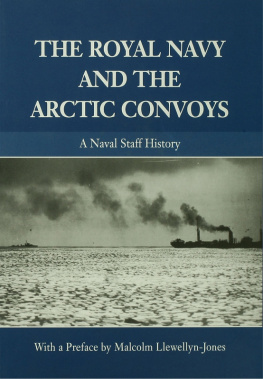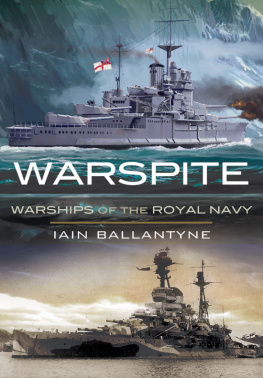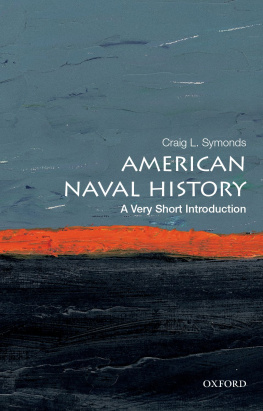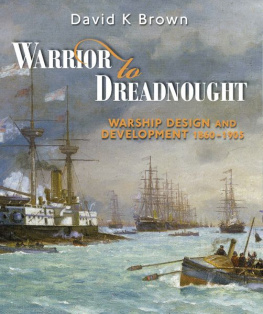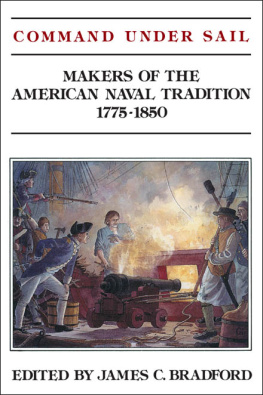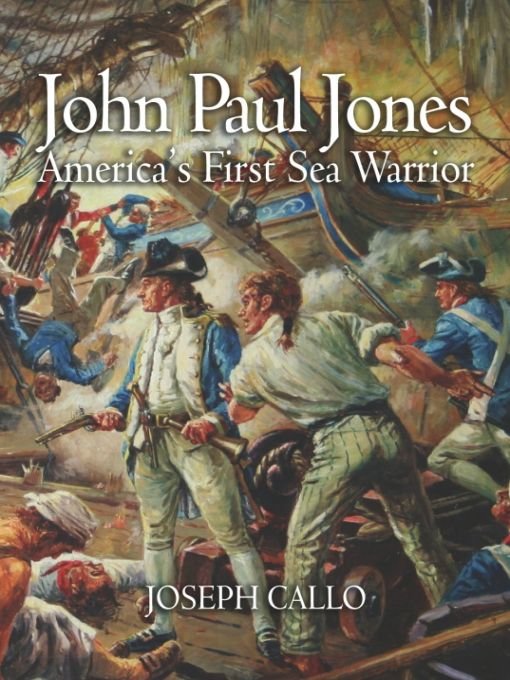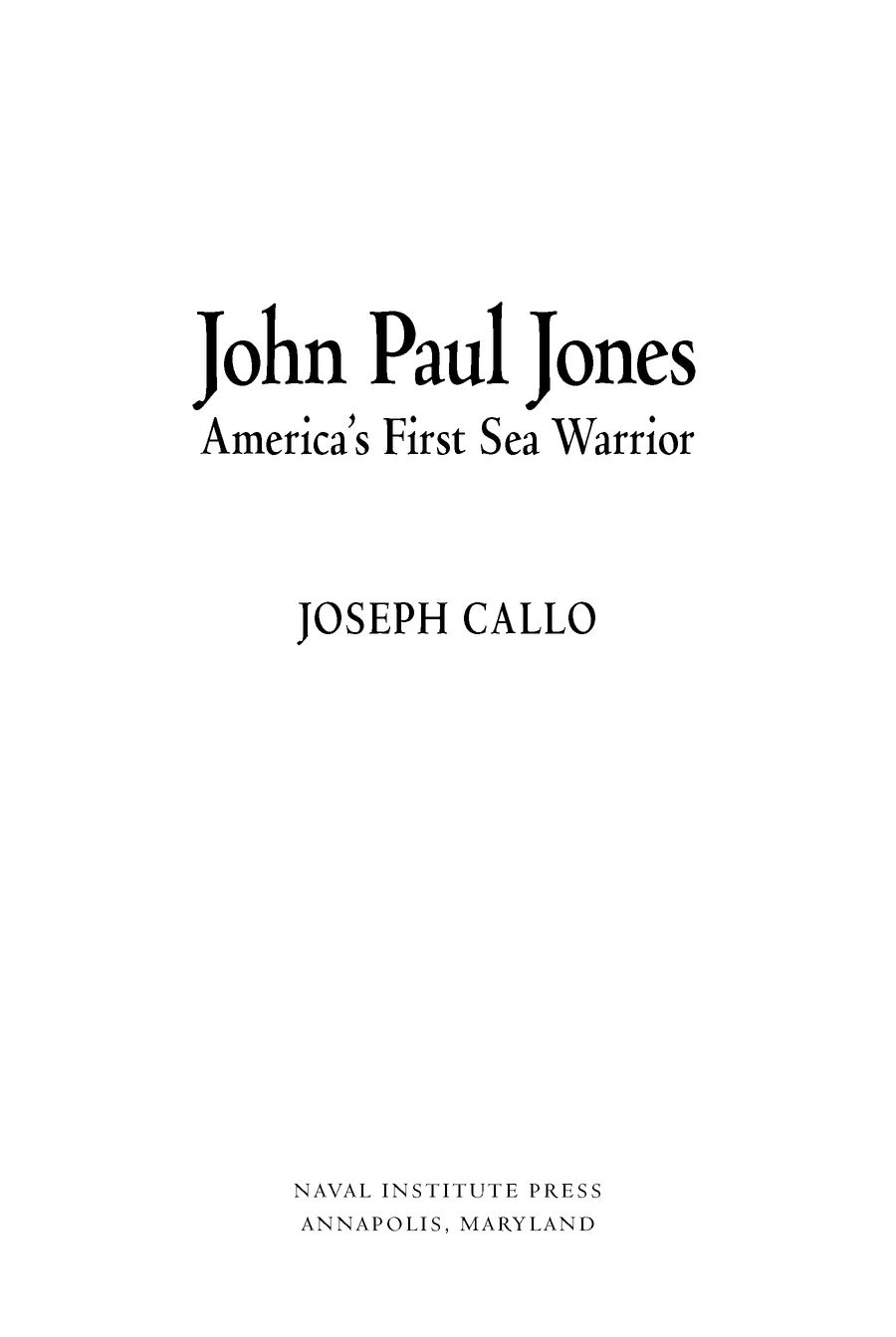Table of Contents
To my parents, who dreamed the life Ive led.
Foreword
John Paul Jones! Theres a name to conjure with. So much so, that writers have tried to co-opt his resounding achievements as a great American patriot and sea warrior to express their own views on life, liberty and the pursuit of happiness. But Jones was a person with strong convictions on living up to these themes of the young American republic, and he was an important player in how those themes played out in a most improbable chapter of history. Admiral Callo makes this clear in this incisive and enlightening portrayal of the man in action, in which Jones speaks for himself, in word and deed.
Joness message has been blurred by over-handling during the nineteenth century and the first half of the twentieth century, notwithstanding President Theodore Roosevelts admonition, Every officer should know by heart the deeds of John Paul Jones. In truth, Joness earlier champions erected a plaster saint, and more recently, others have picked up on his very large ego, quick temper, and his sometimes callous treatment of female admirers to create the image of a bully and social eccentric.
Jones was admittedly a difficult man. Difficult to put up with, if you were his friend. Very difficult to understand, if you wanted to get close to him. And, fortunately for America, difficultalmost impossibleto beat if it was your fate to be his opponent in battle. In fact, few could accept Jones on his own terms, which were often outrageously demanding. As a result he was easily out-maneuvered by lesser men in the politics of advancement and recognition by which people make their careers.
In the crucial instances where he forced things to go his way, he did things that shook the world as people knew it. And if he had not done that, the worldor certainly America and not least the United States Navywould not be what they are today.
One of the most moving letters in this book is from his supporter Benjamin Franklin, who quietly but firmly urged Jones to be less loud in his own praise and in disparaging of the poor performance of others, so that hed have a better chance of getting his own views across. Fat chance. One wishes Jones could have had a stern but kindly father figure in his naval service, as Nelson had John Jervis, to chide him and advise him and then stand back and give his genius free rein.
One fault Jones has lately been accused offinancial greedhe absolutely did not have. A recent commentator condescendingly compared him to Jesse James, the famous Western bandit. The problem with this is that the commentator had his facts wrong. The fact is that Jones regularly refused the easy option of sailing as a privateer, which could have made him both rich and famous. He refused this option because he chose to serve in the Continental Navy. Navy service was not a well-paid job, and it had nothing in common with armed robbery. Joness raids on British towns were, among other things, reprisals for actions by British forces burning American towns to bully the inhabitants into line, as even one British newspaper noted at the time. In his naval service Jones never deliberately killed a single civilian. That renders absurd the notion, recently suggested, that Jones had anything in common with todays terrorists.
The victories that earned Jones his recognition were hard fought. And it took Jones to win themits just not possible to imagine any other captain carrying off the feats he did. Imagine taking a worn-out French East Indiaman, the Duc de Duras, renaming her the Bonhomme Richard, arming her with cast-off guns, and taking her to sea with a polyglot pickup crew to overwhelm and capture a first-class British frigate of the heaviest class, just short of ship of the line status. This would seem more than a little unlikely, but it happened.
What made this near miracle possible? For starters, Jones had a freer hand than in the past to train the crew, and he trained them well and commanded their respect. But that crew couldnt have done it without the invincible resolve of Jones. To that resolve was added his unfailing ability to snatch every advantage possible in a rapidly changing devastating encounter in which his own ship suffered more casualties than his hard-fighting British opponent did. Joe Callo takes you through those fraught developments to show just how the incredible victory of Bonhomme Richard over HMS Serapis was won and what it meant.
The change of name from Duc de Duras to Bonhomme Richard is a vital part of the story and at the epicenter of Joness stormy resolve. Americas French allies, who provided the old ship and her armament, were intent on having her serve under French naval orders. Benjamin Franklin, one of the American commissioners to France living in Paris, had an international reputation and was made much of by the French court. He used his arts of persuasion and sweet reason to arrange freedom for the tempestuous Jones to act as representative of a free republic, rather than one subservient to the French crown. Franklin reminded Jones as he did so that the American bargaining position was weak, the nation having virtually no funds and little credit but what the French saw fit to grant them. So there was solid pragmatic reason behind Joness choice of name for the Bonhomme Richardshe was named for Poor Richard, the pseudonymous author of Franklins famed Almanac.
Look deeper and a more profound reason for the choice of name appears. I believe that Joness choice was more significant than a mere thank you to Franklin for help in securing the frigate. Poor Richard, or Bonhomme Richard, was a uniquely American name, and a practical, serviceable one at that. A Poor Richard could speak for Americaas she did eloquently at the battle off Flamborough Headas no Duc of Duras ever could. Poor Richard was an expression of the American ethos.
Joness feats in carrying the war to the shores of the greatest naval power in the world played a vital role in winning the American Revolution. The British losses in ships and men, and their forced diversion of ships and men to catch Jones, were costly to the enemy. But far more important was the impact on public opinion, above all among Americans themselvesstill divided in the 1770s, still unsure of their ability to defeat an enemy all-powerful at sea. And the effect on British public opinion was monumental. Edmund Burke in Parliament had been leading the charge that Americans were fighting for British rights. Admiral Lord Richard Howe, leader of the large invasion force assigned to conquer New York, proceeding cautiously from the outset, had resigned when he saw that Americans were determined to fight for their freedom. He returned to London to use his considerable influence to end the war. Joness victories underlined the truth of Howes findings, as nothing else could. While much of the British press reviled Jones as a pirate, other newspapers spoke up in his defense. So the strategic effect of Joness victories had a compelling ultimate role in encouraging Britain to opt out of the war after Washingtons army, with French support and naval intervention, brought about the strategic victory at the battle of Yorktown in 1781.
Jones never commanded large squadrons or fleets in the Continental Navy. The one good-sized squadron he did commandthe one formed around the


